West Yorkshire Police: On shift with the 999 call handlers
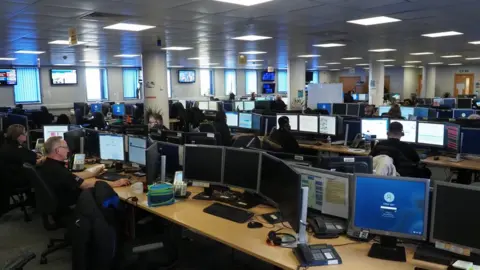 BBC
BBCWest Yorkshire Police receive 1,300 emergency calls a day - varying from life-or-death situations to the "ridiculous". The BBC's Tom Airey spent a day with the team which claims the best record in the country for 999 call responses.

When call handler Rebecca Starling accepted a 999 call made from a mobile phone near a motorway bridge, she quickly realised the seriousness of the situation.
"It was the first call I'd ever dealt with where I thought - he is going to jump," recalls Ms Starling.
"You could hear the traffic underneath.
"I was speaking to somebody who was about to throw themselves off a bridge."
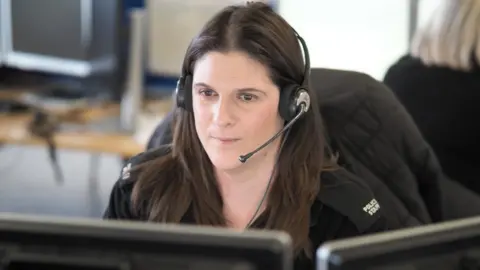
While keeping a conversation going, Ms Starling worked out the man's location from geographical clues he shared and logged the call as an emergency, with police diverted to the scene.
"I had no idea how long it would take the officers to get there, so we scrabbled about for things to talk about," the 39-year-old says.
Two passing members of the public rugby-tackled the man just as officers were approaching, while Ms Starling shouted instructions to them down the phone.
"I kept him talking and I'm so proud of that call," she said.
"We got him off the bridge and made sure he got the help he needed, it was such a positive thing out of a desperate situation."

- If you have been affected by any of these issues, you can visit the BBC's Action Line or contact the Samaritans.

Tom Donohoe, senior contact manager at the Dudley Hill contact management centre in Bradford, says Ms Starling showed all the attributes required for a successful outcome.
"Compassion is top of the list, it might be the only time they've ever rung us and it might be in life-changing circumstances," he says.
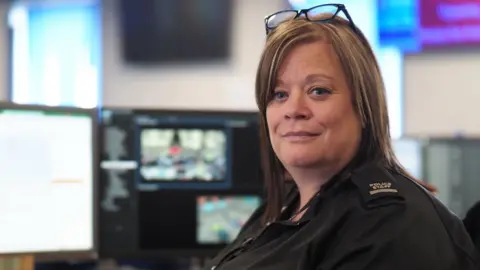
The fourth largest police force in England and Wales is marking a landmark five years without failing to answer a 999 call, thought to be a national record.
Zoe Riddiough, a contact supervisor, is shuffling her staff around to make sure there are sufficient handlers to match the current demand of 999 calls, 101 enquiries and the force's online services.
"Tonight is going to be a struggle, we're understaffed," she says, while looking at the rota for the force's contact centres in Bradford and Wakefield.
It's already a busier-than-usual day for the force, which is handling a major royal visit to the city.
"You can see him there in the grey jacket," says Ms Riddiough, pointing to King Charles III on a live CCTV link.
As the King shakes hands with young leaders from the district inside City Hall, police are keeping a close eye on a small group of protesters holding placards outside the civic building.
The call handlers are hoping there won't be trouble - any extra demand on police resources means there are fewer officers to respond to emergencies elsewhere.

999 or 101?
- Only call 999 in an emergency where there is a danger to life, or a crime in progress
- You should call 101 when it is less urgent than 999 but you need to report crime or disorder
- Other online methods are available to contact police, including the Local Crime Tracker, 101 Live Chat, or by using the Ask the Police facility
Source: West Yorkshire Police

The contact centre, next to a busy junction in south Bradford, could be mistaken for any other bustling call centre business, apart from tell-tale screens on the walls sharing the all-important statistics of how many calls are waiting and the average time it is taking to answer them.
Glancing up at one of the screens, contact supervisor Vince Stevens says: "It's one of the most demanding jobs I've ever come across, and I've been a cop for 30 years, because of the pure volumes."
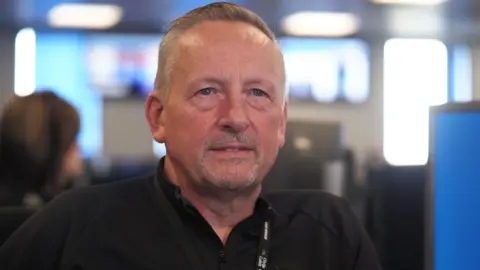
About 95% of public contact with West Yorkshire Police comes through its two contact centres, with inappropriate calls causing a daily headache for already stretched staff.
The force says these account for 15-20% of all 999 or 101 calls and tend to arrive during the busiest times of the shift.
"We handle ridiculous 999 calls on a daily basis," says Ms Starling.
During this shift so far, her fellow 999 call handlers have spoken to someone complaining an Amazon parcel delivery hadn't arrived and another who said someone was "being rude" to them on Facebook.
"I once got a 999 call from a lady in West Yorkshire who said her friend, who lives in Greece, had a stray cat in the house and she was scared of it," says Natalie O'Shea, 32, a contact officer who has just marked two years on the team.
The centres employ about 215 staff, working a variety of shifts to provide around-the-clock assistance.
Many typically work 10-hour shifts on a six days on, four days off pattern, with a current recruitment drive looking to bolster parts of the stretched rota.

West Yorkshire Police call statistics for 8 November
- 4,014 contacts received (999, 101 and online requests)
- 1,248 calls to 999
- 2,133 calls to 101
- Average queue time on 999 was 4 seconds - better than average
- Average queue time on 101 was 4 minutes 43 seconds - slower than average
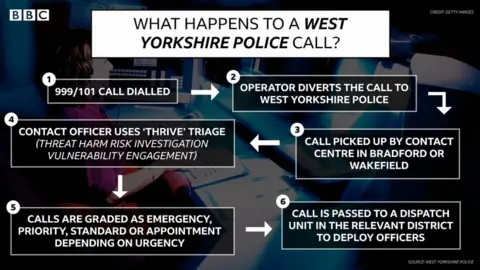

New recruits, who often have no previous police experience, typically go through a rigorous three months of training, with a team of trainees in the room next door learning the ropes.
The force's contact officers earn a salary of about £28,500 at initial appointment.
"We bring candidates into a room and we play them sanitised versions of the calls they would hear while on the phones," Mr Donohoe says.
"There's no shame in this, but three or four people in every group will say 'thanks, but no thanks' and off they go."
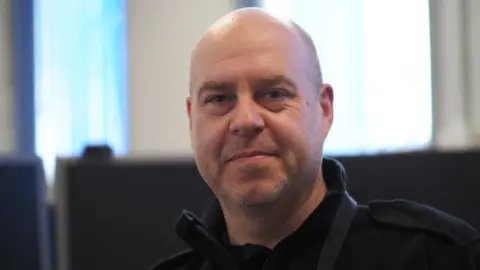
Nick Raleigh, a 43-year-old contact officer who was a new recruit three months ago, says: "I've had some awful calls to deal with, rapes and things like that - stuff you know you're going to be getting but until you get that call you don't know how you're going to react to.
"At the end of the call you know you have helped them in their moment of need, and that's the reason I came to the role."
The force says staff are given quiet rooms to "decompress", with support groups and close links with mental health charities in place to ensure staff have the necessary support.
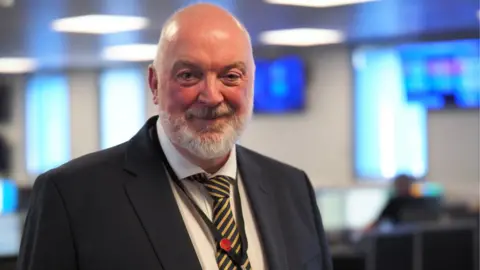
Mr Donohoe, who is retiring in December and started his police career in 1992 as a call handler, says he's "very proud" of the force's record of answering every 999 call swiftly, but admits it can often lead to shortages elsewhere.
"Sometimes our 101 service suffers because of the amount we focus on 999," he says.
"We need to educate the public to remove that 20% of non-police calls so our 101 service becomes as good as our 999 service.
"We've got the two easiest numbers to remember in the world, so we have people who don't think before picking up the phone."
Ms Starling, who's nearing the end of another busy shift, is reflecting on a rollercoaster two years with the team in Bradford.
"I knew I needed a challenge, hence the career change, and I'm so glad it has turned out to be the challenge it has," she says.
"We do amazing things every day, in different quantities, but the day I took [the motorway bridge call] I thought that's the first time I've made a huge difference to somebody's life."

Follow BBC Yorkshire on Facebook, Twitter and Instagram. Send your story ideas to [email protected].
